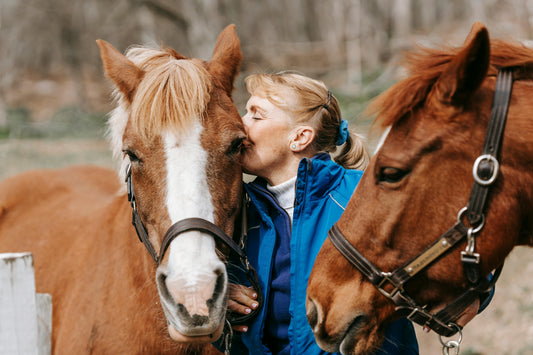Have you noticed how some horses shine and reflect, while others have less vibrant and reflective coats? Well, it all comes down to skin care. Yes, even horses have skincare needs.
After all, those glossy-coated beauties aren’t born that way. Behind every shiny mane and smooth flank, there is a bit of science. But don’t go after your favorite skincare or haircare brands. They don’t work the same on horses. Horses do need special care, and there are a few tricks when it comes to making their coats look shiny.
So, in today’s article, we’ve decided to explore the science behind equine skin care. What do horses really need? What are the best practices? Can some ingredients be harmful?
The Secret to That “Glossy Coat” Isn’t Just Good Genes
Yes, having good genes helps, but the secret to a shiny coat that will mesmerize you for hours lies in hours of hard work, balanced diets, and often specialized equine skincare products. The sheen isn’t just natural. Horses require special grooming practices and a diet in order to look their best.
Kind of like us. You can use all the best skincare brands in the world, but if your diet is messed up and you eat unhealthy food all the time, your skin won't look as good.
Some horses have beautiful coats that look like they came straight out of a shampoo commercial. So, to achieve that?
Well, horse owners need to understand that horses have very sensitive skin. It’s much more sensitive than human skin, actually. It’s thinner and reacts quickly to irritants, humidity, and even changes in bedding. That means that everything from the soap used during washing to the type of brush can affect their skin health.
A harsh shampoo might also leave dry patches and itching. Itching is a horrible problem for horses. They cannot stand it.
They lose their performance and feel irritated at all times. The worst thing is having a racehorse ready to appear in the Breeders’ Cup Classic, and days before, there is an itchy skin irritation. That’s why you should always follow the Breeders’ Cup Classic odds by TwinSpires, since they can often predict that as the odds shift as the event gets closer.
On the other hand, too little cleaning or bad hygiene can learn to sweat build-up and oils that will irritate their skin. The best thing is to have a fine balance between cleanliness and natural oil protection.
Sunburns, Allergies, and Bug Drama
Another thing that most people don’t realize is that horses can get sunburned. Yes, especially those with lighter coats or pink noses. They’re practically sunscreen influencers waiting to happen.
That’s why trainers use UV-protective sprays or physical barriers like fly masks to protect them from the sun.
If this doesn’t make things difficult enough, we have the allergy drama. Dust, pollen, or certain feed ingredients can cause skin flare-ups. And let’s not even start with the insects. Mosquitos and midges are always around horses just because they have an easy skin to penetrate. So, if this is the case in your stable, maybe you should use some fly sprays and soothing ointments.
Grooming = Skincare for Horses
Grooming is very important for horses, and it is their natural skincare routine. Think of it as a daily spa treatment, only for horses. Brushing not only removes dirt and debris but also stimulates blood flow. It also helps spread natural oils, giving that silky shine that we all look for in a horse.
So, horses that have shiny coats don’t use special shampoo or artificial skin oils. That’s their natural skin oil spread on the hair.
The Skincare Aisle for Horses Is Real
You might laugh, but since horses are very complicated to take care of, and since their skin is so sensitive, they require special products, which means that the horse skincare market is huge. We are talking about medicated shampoos, coat conditioners, aloe-based gels, tea tree oil sprays, and special horse serums.
Some stables even use products infused with vitamins E and B5 for hydration and coat elasticity, but there is no scientific study that proves this helps.
There’s also a growing movement toward natural and organic products, because just like humans, horses can react badly to synthetic fragrances and harsh chemicals. Brands are leaning into eco-friendly formulas that protect both the animal and the environment.
Unhealthy Skin Can Lead To Performance Drops
For us humans, skincare is all about looking good, but that is not the case with our equine friends. Here, skincare products and routines are directly connected to health. Skin issues can lead to discomfort, distraction, and even reduced performance, and nobody wants that, right?
A horse that’s itchy or irritated won’t run its best race or even train effectively. So, keeping their skin healthy is the trainer’s top priority. Clean and healthy skin helps regulate body temperature, prevent infections, and keep that thick coat breathable.
It’s not like there are special conditioners that need to be applied. It all takes the right shampoos, and the balance between being very clean and maintaining natural skin oils.
So, Do Horses Really Need Skincare?
In short, yes, they need it. But it's not like us humans, and don’t expect to buy matcha-infused products and put cucumbers on your horse’s eyes with a dissolving mask. They are much simpler than that.
Their skin only requires maintenance. That’s why horses need to be groomed and cleaned regularly.
So, next time you see a racehorse shining under the sunlight, try to appreciate it more. After all, a lot of hard work went into making their coat shiny.







